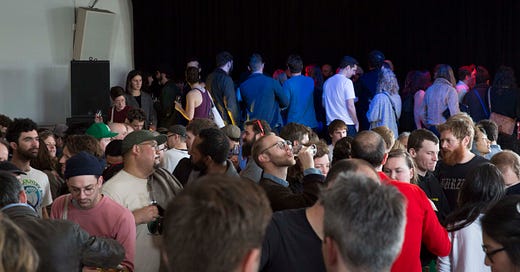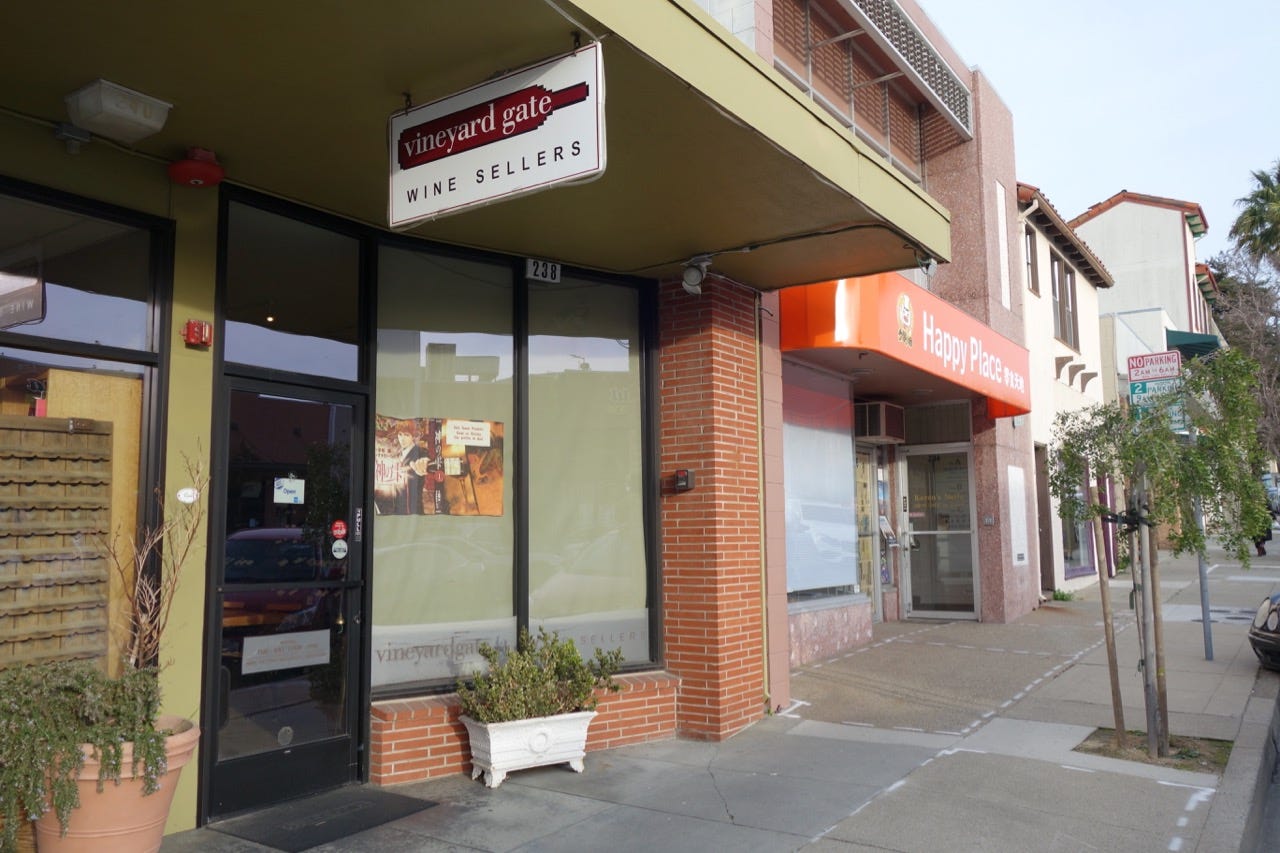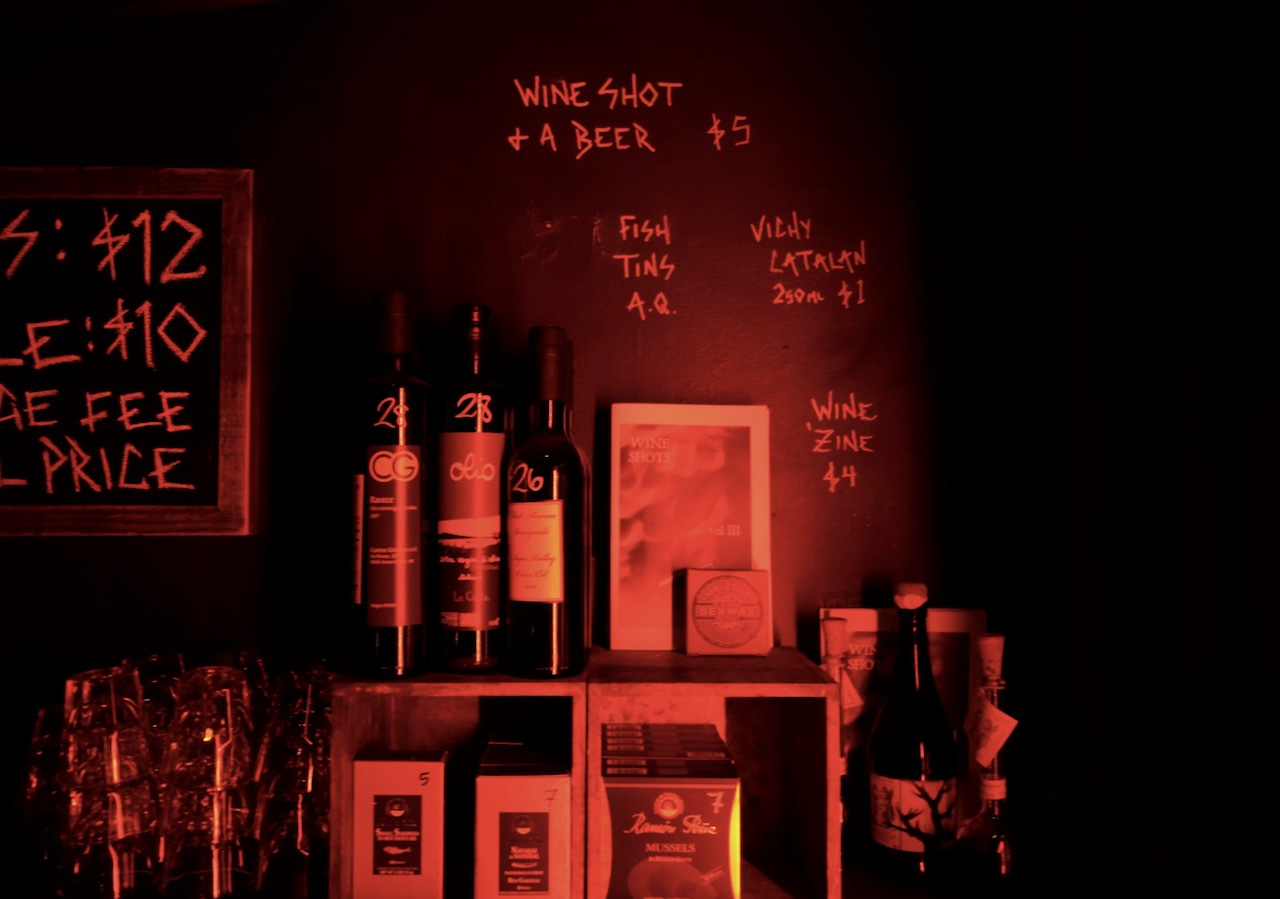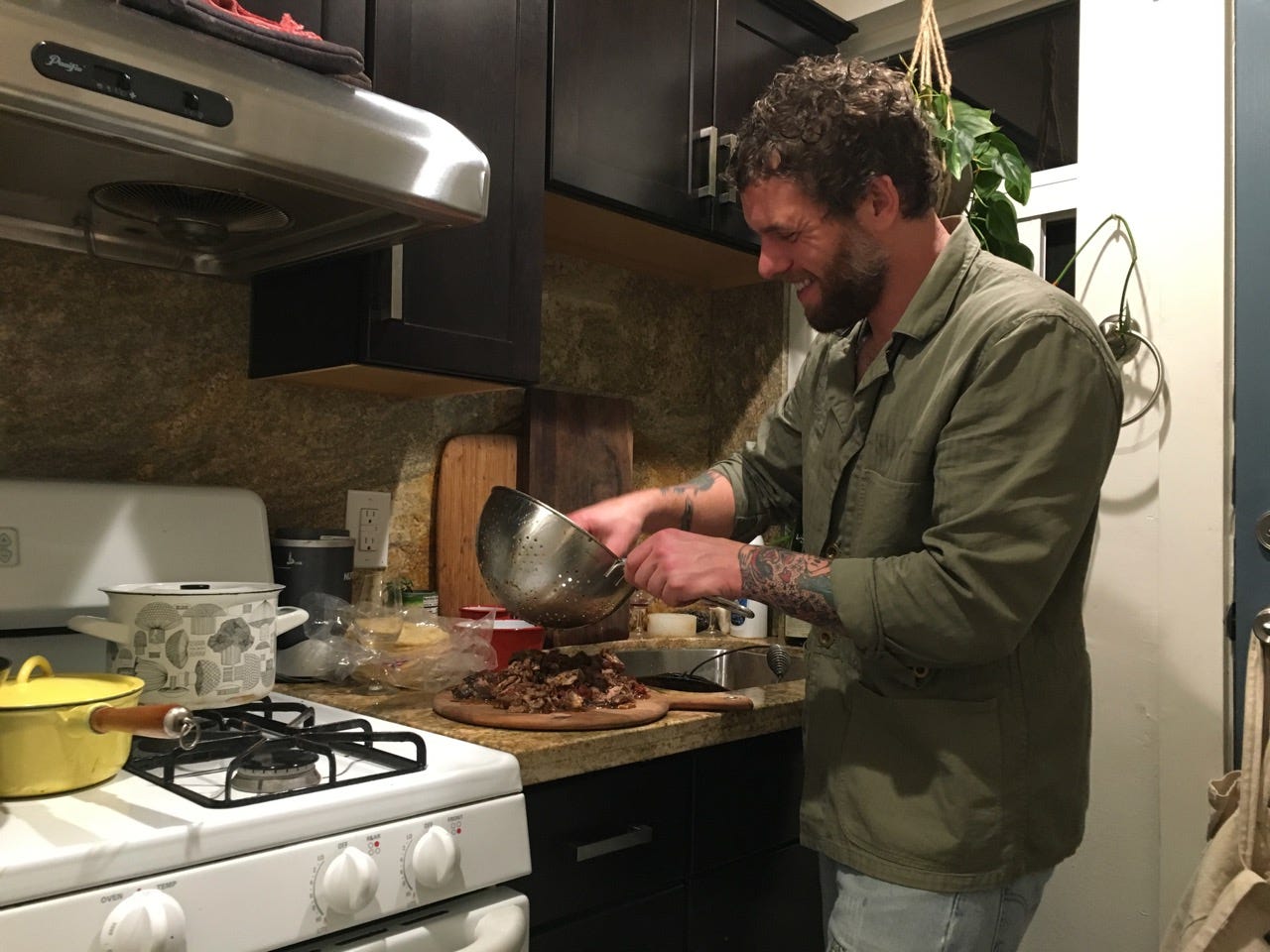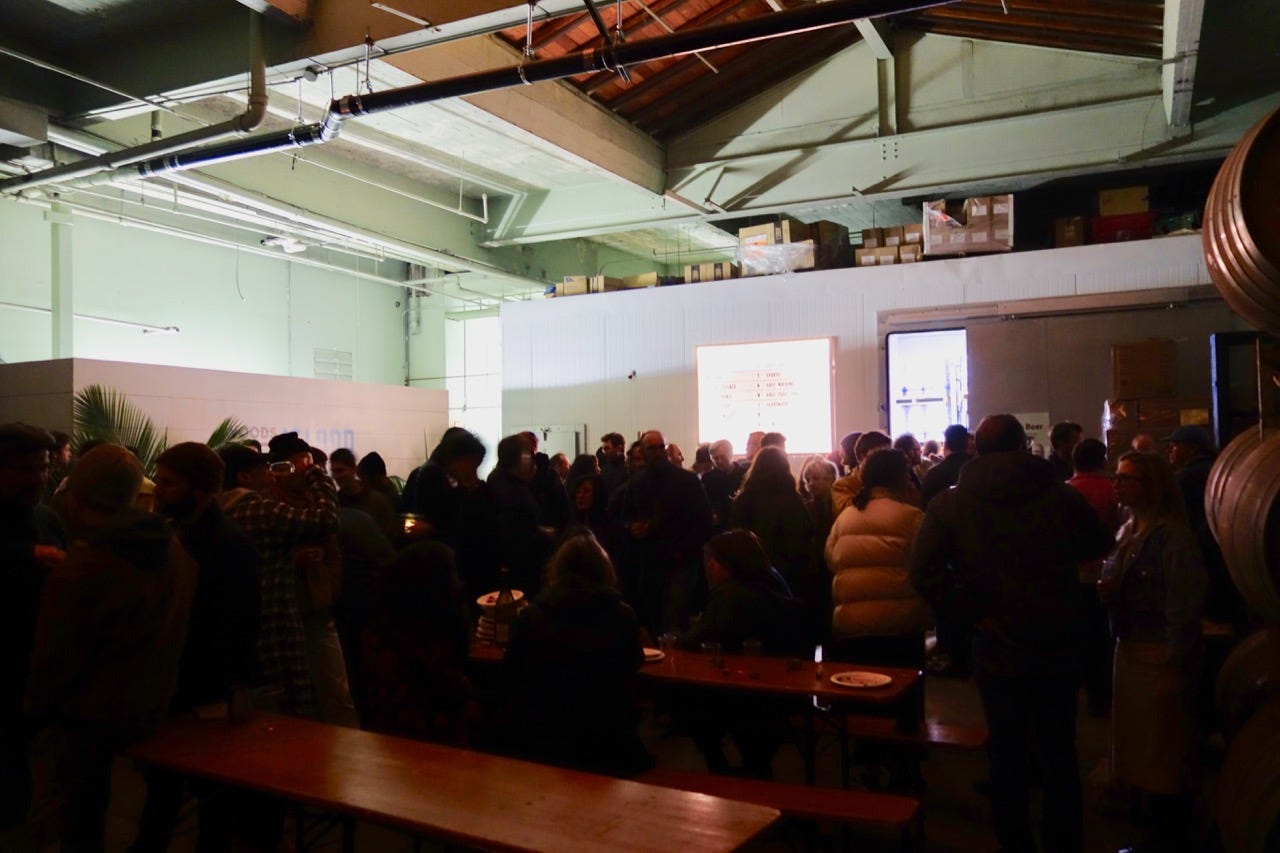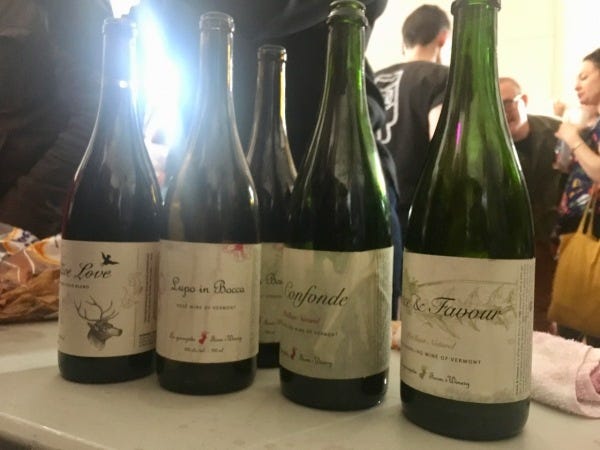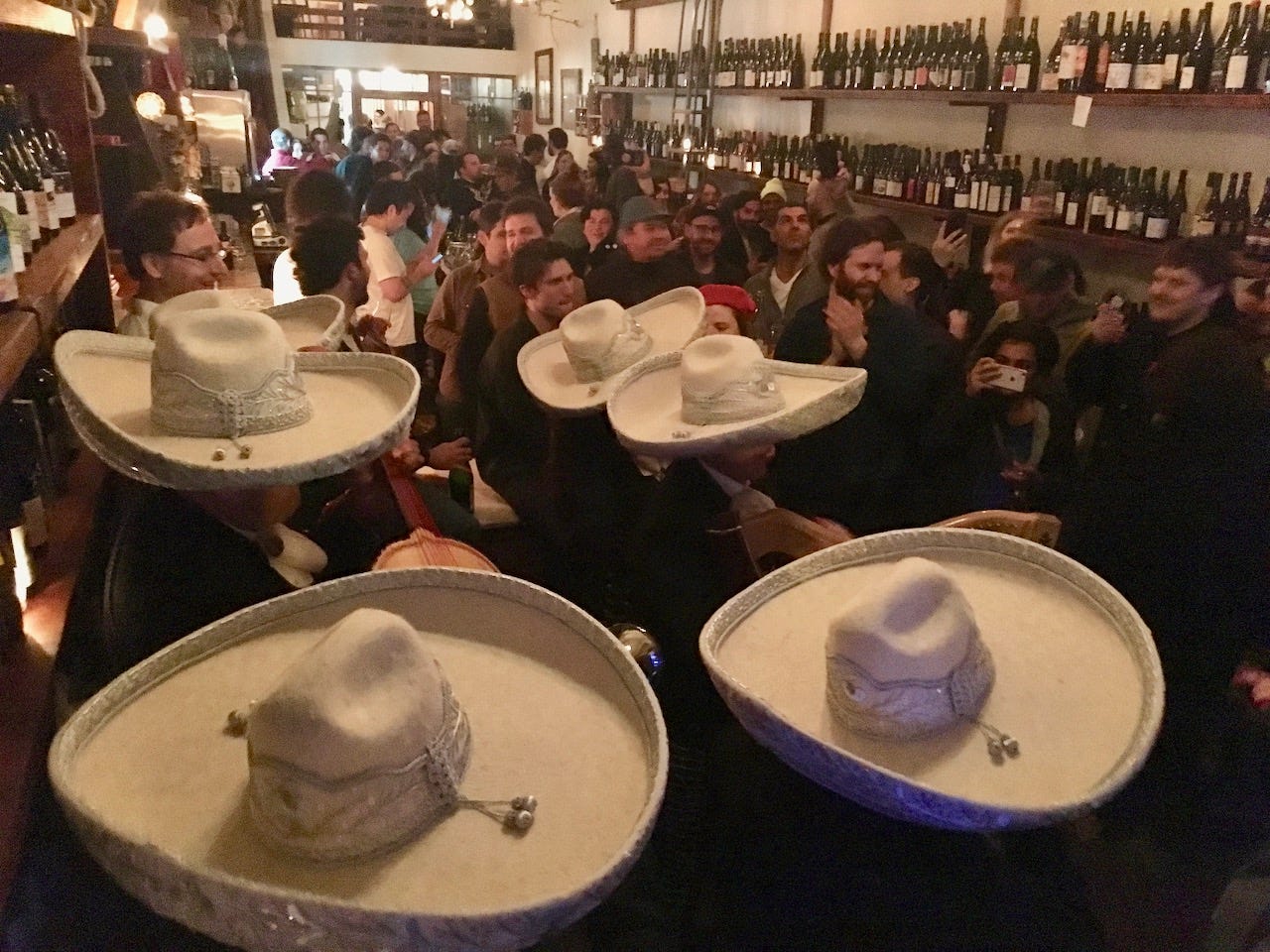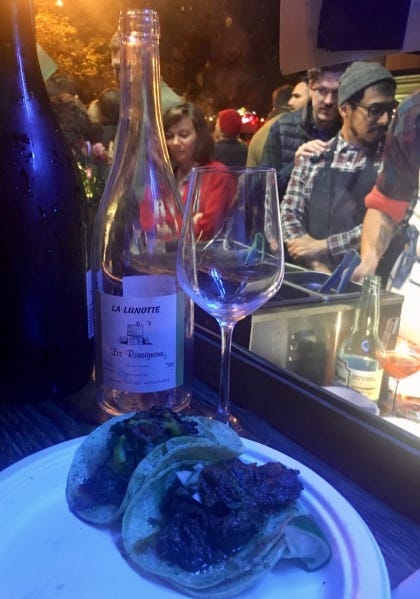I often wonder if natural wine in the USA has sort of passed me by - as a concept, as a cultural phenomenon, as a business opportunity. The phrase itself had eked its way into select US wine circles - but no further - when I moved to Paris in 2009. When I revisited Los Angeles in March 2019, I saw natural wine advertised on the side of a Gelson's supermarket. In the decade it has taken me to move from Blogger to Wordpress, natural wine in the USA has metastasized from a subcultural rumor to a widespread and ill-understood buzzword. (I.e. The same state of infamy in which it has persisted in France for the past two decades, with certain key distinctions.) Nowadays I spend my semi-annual visits stateside squinting at wine lists and shop shelves in efforts to gauge just how much significance the phrase "natural wine" retains.
Given all this, I was delighted, this past March, to be invited to attend the fourth edition of Brumaire, a cross-cultural natural wine salon in Oakland that I sense has become, thanks to the dedication and discernment of its founders, the premier hub for actual, non-supermarket natural wine culture in the USA. For someone like me, largely confined to Europe for the past ten years, it was an eye-popping experience.
Brumaire is run by three figures I know from their frequent trips to France - Bradford Taylor, founder of Oakland wine bar Ordinaire; Josh Eubank, founder of Percy Selections; and Quinn Kimsey-White, a former Ordinaire employee who founded Psychic Wines in Los Angeles - and their friend Matt Coelho, of San Francisco's Woods Beer Company.
While centered around a full-to-bursting Sunday tasting at Oakland's Starline Social Club, Brumaire could be said to encompass a sequence of events spread out over several days, beginning (as far as I'm aware) with a "Kosuke Bistrot" dinner event at Ordinaire two days before the tasting, continuing at a party called "Luau" on Woods Island the following evening, and more or less terminating with a raucous fiesta at Ordinaire after the tasting. (Sibling events and tastings are also held throughout the weekend at Oakland natural wine bar The Punchdown, and San Francisco wine bar Ruby Wine. And presumably elsewhere.)
I took advantage of the trip to California to visit a bevy of natural (and quite-natural) winemakers in the week preceding Brumaire, an illuminating experience that I should probably parcel out into several distinct articles. Here I'll just share some impressions of events directly and indirectly related to Brumaire, as well as the wider natural wine retail scene I finally encountered in San Francisco and Oakland.
First, something unrelated to Brumaire: Vineyard Gate in Millbrae, where I drove shortly after landing at SFO.
Founded in 1998, Vineyard Gate is arguably the first US wine shop to have begun focusing on natural wines. I'd met owner Alex Bernardo a few years ago in the Beaujolais, over lunch with our mutual friend Romain des Grottes. No further test of sincerity is needed if, like Bernardo, you are a longtime direct-import client of Romain des Grottes, whose full-throttle, zero-sulfur, zero-filtration, zero-elevage, biodynamic gamay wines are challenging sells even in present-day France. Bernardo is of a different generation from his successors across the bay in Oakland, and I sense the two scenes don't intermingle as much as they might. His shop's location - unhip, hotel-strewn Millbrae - renders the savvy and radicalism of his wine selection all the more impressive. We had a late lunch of take-out Chinese with a pleasantly turfy cabernet sauvignon pet'-nat' from San Diego-based Los Pilares.
A few days later I had the occasion to enjoy a few bottles at the bar of Ruby Wine on Protrero Hill in San Francisco proper. I'd met owner (and former CA winemaker) Aran Healy here and there in France over the past few years and was delighted to finally experience his establishment, which resembles less a wine shop than a sort of tiki-lit clubhouse for natural wine habitués.
Its limited shelf-space contained an enviably disproportionate amount of aficionado bottles, from Hervé Souhaut's benchmark Saint-Joseph "Saint Epine," to Julie Balagny's soaring Fleurie "Bella Ciao," to Nicolas Carmaran's bristly Aveyronnais red "Fer de Sang." Later we toodled across the street to Healy's apartment, which amusingly doubles as a sort of retrobottega or back-of-shop for his wine bar. The secret to the marinade for the astonishingly flavorful carnitas he prepared? The ends of natural wine bottles from across the street.
Brumaire-related pregaming began a few days later with "Kosuke Bistrot," a dinner event at Ordinaire that featured Kosuke Tada, a chef I knew from his 2017 stint at Le Six Paul Bert, Bertrand Auboyneau's ever-evolving contemporary market-menu restaurant in Paris.
There is a peculiar sort of déjà vu when a mid-2010's Parisian market menu - its slender sensibility, its raw fish dabbling, its modest scale - is expertly transplanted to the USA, land of large portions and largesse. In terms of the substance of the meal, I was vaguely reminded of Jeremiah Stone's Contra in Manhattan. Oakland is not Manhattan, however, and Tada's menu, at three courses and $42, excelled in both value and quality even by Paris standards. The only perceptible difference was positive: a dazzling appetizer of hamachi crudo cut far broader and more generously than one ever sees it in France. (One almost never sees hamachi in France, in fact.)
Ordinaire owner Bradford Taylor made the rounds in his normcore neon short-shorts and baseball cap, super-attentive and welcoming despite what I imagine must have been a titanic organisational effort that weekend. I dined with the (Non-) Native Companion and my friend and fellow Paris-based natural wine writer Bert Celce.
Taylor gamely found us several impressive bottles of New World natural wines, including a glimmering and toothsome Margaret River chardonnay by Sam Vinciullo. (I later learned the wine is distinguished from many of its California counterparts by dint of having been dry-farmed since 2016. It's a start.)
Ordinaire was larger, more echoing that I'd expected - like a supersized version of the prototypical long, narrow wine bar of Paris. To the left when you enter, performing the role of home-town mascot, is a choice selection of New World natural wines; to the right, facing the immense bar, is a significantly more extensive selection of European natural wines. A dark air-conditioned room on the upper level serves as a cave, which for all its architectural shortcomings is chock-a-block with back-vintages from the crème de la crème of natural wine, including less-than-obvious classics from perennially underrated winemakers like Kenji & Mai Hodgson and Christophe Foucher of La Lunotte.
As for many natural wine establishments abroad, Paris' Le Verre Volé is an oft-cited touchstone for Ordinaire. The comparison is inapt, and short-sells the achievement of Taylor and his team, including manager Quentin Jeanroy, who formerly worked at Le Verre Volé. That establishment has always been a restaurant dressed in the service style and decor of a wine bar, whereas Ordinaire is an actual well-stocked fun wine bar that successfully moonlights as a restaurant from time to time. Paris' natural wine bars, with certain exceptions, are ill-provisioned by comparison. (Taylor says in the past he has toyed with offering full restaurant service, only to find that the local clientele responded far better and more consistently to one-off, pop-up events like "Kosuke Bistrot.")
The following evening I made the error of arranging to meet an ex-girlfriend at another Oakland natural wine bar, The Punchdown. I hadn't seen her in years - she'd gotten married in the meantime - and upon entering the bar I immediately realized we would have almost zero chance to catch up, because also making the rounds that night were Marie Tribouilloy of Bushwick's Foret Wines and three of Brumaire's guests-of-honor, the Beaujolais winemaker Philippe Jambon, Burgundy winemaker Julien Altaber, and Mâconnais winemaker Julien Guillot. (The two other ambassadors of French natural wine in attendance at Brumaire 2019 were Christophe Foucher and Julie Balagny. That I happen to get along with and genuinely humanly appreciate all five of these winemakers felt like kismet.)
I'd chosen The Punchdown for the rendez-vous because my friend and fellow natural wine writer Jenny Eagleton works at the bar. But as it turned out I'd met owners DC Looney and Lisa Costa years before in Paris, too. An already memorable occasion was made unforgettable by a beautiful bottle of Tony Coturri's 1984 Sonoma Pinot Noir, which drew appreciative commentary from the French delegation. It was, by a very large margin, my best experience with a birth-year wine. (I hail from the same vintage, a terrible one for much of Europe.)
Afterwards we set off in taxis for the "Luau" party on Woods Island, an occasion which proved non-conducive to photography for reasons of rain, low-light, crowds, dancing, and fun.
I was happy to re-encounter Mike Fadem of Brooklyn's Ops Pizza, who along with Kosuke Tada provided cuisine for the evening. That the American chefs and restaurateurs and importers publicly associated with natural wine - hailing from both coasts of the USA and beyond - are uniting on such occasions is encouraging, for I suspect natural-wine-in-the-USA will come to mean about as much as these very people can agree it means. (A similar dynamic pertains in France.)
I have very few photos from Brumaire itself, an oversight I attribute to being totally wracked with fatigue after a week of visiting winemakers. The physical environment of the Starline Social Club is very appealing, wood-paneled and roomy, and the fact that the bar stays open during the tasting makes for a very agreeable pressure-release for those moments when tasting among crowds becomes intolerable. I can see why the founders persist in holding the tasting here, despite increasing pressure to move to a larger venue.
I adored wines from Tony Coturri, Absentee Winery, La Onda, and others, but I didn't take pictures at Brumaire because I had just visited their cellars the previous week. I did take one picture of the wines that most surprised me that day, those of Deirdre Heekin of La Garagista, whose cuvées of Vermont rosé and pet'-nat' have really blossomed since I last tasted with her at La Dive Bouteille several years ago.
(In cases where I find myself disappointed by recent California natural wines, it is often due to the figurative sensation of a lack of sève, or sap, attributable to irrigation and imprecise or unwise harvest timing. Heekin's low-alcohol, cold-climate wines, lighter than air, still have sève.)
The Brumaire tasting is divided between more established wine domaines upstairs, and a side room devoted to "Young Guns," or winemakers in first or second vintages. I regret not spending as much time as I should have in this latter room, where friends like Brent Mayeaux and Wolfgang Weber were pouring. Everyone in the room, which is to say everyone embarking on the project of winemaking without additives, deserves encouragement. But about the actual project of producing natural wine in California - in the face of systemic agricultural havoc indissociable from intractable real estate issues - I have trouble being optimistic. I choke up.
I try to bear the same reality in mind when considering what British wine writer Andrew Jeffords would perhaps call the "flak" about Brumaire. I sense the event has attracted minor controversy due to its exclusive nature (there's a waitlist for tickets), it's slightly high cost ($32 for entry), its self-awareness (c.f. Ordinaire's conspicuously well-curated Wikipedia page) and, inevitably, the youth and dynamism and tattoos and long hair and piercings of its participants. (As if these things were barriers to wine understanding. Consider that a fair proportion of actual European cellar-hands and vineyard workers resemble, or in fact are, dog punks.)
I'm among those who view the scene-y nature of Brumaire as a more honest presentation than the alternatives. It would be really sweet for an event (or, say, a series of events) to proclaim to the largest possible audience that natural wine is easy to understand and accessible and affordable to all. But that would be misleading. America - not to mention the world-at-large - is a vast market. For natural wine to become readily and affordably available to all citizens would involve large sacrifices to its identity, at least where it concerns production methods. Chemically-vinified, filtered wines from chemically-farmed, irrigated vines will remain cheaper; barring a mass revolution in consumer-consciousness, such wines will continue to dictate mass consumer expectations of wine price and wine quality. (That many excellent natural wines presently cost less, for US consumers, than quote-unquote "premium brands" is, I fear, a temporary state of affairs, with a basis in the gloriously irrational paysan pricing of many French natural wine domaines.)
As I see it, Brumaire - like Ordinaire, and Ruby Wines, and The Punchdown, and like Vineyard Gate - deserves admiration for upholding a meaning of natural wine that closely tracks what can be gleaned from the loose, argumentative community of natural winemakers in France. In doing so it runs counter to all measurable market incentives, which surely would recommend a more devious, "inclusive" approach.
In any event, the Brumaire after-party back at Ordinaire comprised a rejoinder to any accusations of elitism. It was a riotous, no-corkage extravaganza spilling far into the street, replete with something one never sees in Europe, something that will probably prove to be the New World's greatest contribution to natural wine culture: a weepingly great taco stand.
Ordinaire
3354 Grand Ave.
Oakland, CA 94610
Tel: +1 510 350 7524
The Punchdown
1737 Broadway
Oakland, CA 94612
Tel: + 1 510 788 7877
Ruby Wine
1419 18th St.
San Francisco, CA 94107
Tel: +1 415 401 7708
Vineyard Gate
238 Broadway
Milbrae, CA 94030
Tel: +1 650 552-9530
FURTHER READING
I could never compete with Bert Celce's timely and minutely-detailed report on Brumaire 2019 at Wine Terroirs.
A 2017 interview with Bradford Taylor of Ordinaire in Sprudge Wine. A 2018 interview with the "Brumaire Steering Committee" at Sprudge Wine.
Jordan Michelman's long 2017 interview with Aran Healy of Ruby Wine in Sprudge Wine.
A laudatory 2016 article on Ordinaire by Esther Mobley in SFGate. In her 2018 article on Brumaire for The San Francisco Chronicle, Esther Mobley asks if natural wine is ready to "mature" in the Bay Area.
In her 2018 article for Sprudge Wine, Jenny Eagleton calls Alex Bernardo "a wine buyer's wine buyer."
In his 2018 article for Sprudge Wine, Noah Sanders cites The Punchdown's owners as "carriers of the natural wine torch."

